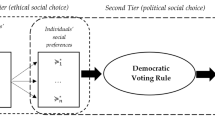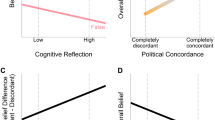Abstract
Following Anthony Downs’s classic economic analysis of democracy, it has been widely noted that most voters lack the incentive to be well-informed. Recent empirical work, however, suggests further that political partisans can display selectively lazy or biased reasoning. Unfortunately, political knowledge seems to exacerbate, rather than mitigate, these tendencies. In this paper, I build on these observations to construct a more general skeptical challenge which affects what I call creedal beliefs. Such beliefs share three features: (i) the costs to the individual of being wrong are negligible, (ii) the beliefs are subject to social scrutiny, and (iii) the evidential landscape relevant to the beliefs is sufficiently complex so as to make easy verification difficult. Some philosophers and social scientists have recently argued that under such conditions, beliefs are likely to play a signaling, as opposed to a navigational role, and that our ability to hold beliefs in this way is adaptive. However, if this is right, I argue there is at least a partial debunker for such beliefs. Moreover, this offers, I suggest, one way to develop the skeptical challenge based on etiological explanation that John Stuart Mill presents in On Liberty when he claims that the same causes which lead someone to be a devout Christian in London would have made them a Confucian in Peking. Finally, I contend that this skeptical challenge is appropriately circumscribed so that it does not over-extend in an implausible way.
Similar content being viewed by others
Notes
For a description of this case and its epistemic import, see for instance Elga (2013) and Schoenfield (2018). For an extended discussion of how epistemic principles might provide useful guidance and how we might use heuristics such as the one proposed in this paper, see Ballantyne (2019), particularly Chapters 3 and 4.
For a recent discussion and defense of the general phenomenon of motivated ignorance, see Williams (2021a). Relatedly, standpoint epistemologists and critical theorists have argued that members of dominant social groups are willfully ignorant of certain features of their position even where such information is easily available. For a classic discussion of this idea, see Mills (2007), and more recently, Kinney and Bright (2021) and Woomer (2017).
For further discussion on how such biased evidence gathering and processing mechanisms can operate in the political case, see Huemer (2016).
Of course, this distinction is a rough one, and there are bound to be cases that are vague. Furthermore, it’s plausible that because of the different kinds of media and internet content that partisans consume, they are likely to be ignorant of basic and easily verifiable facts that might serve to challenge their worldviews—for example, facts about the prevalence of abortion, the relative amounts of defense versus social welfare spending, etc., depending on the case. However, it seems to me that even on such points, disagreement is typically unlikely to persist once the relevant facts are interpersonally verified. Yet such claims usually function as rationalizations for more complex political claims that are more central to partisan ideology. A committed partisan, even when he is made aware of and acknowledges a piece of conflicting evidence might nonetheless move to other bits of (putative) evidence that he sees as supporting his position.
This premise is in part supported by the extensive literature within social psychology and political science, discussed above. The sorts of evidence-processing tendencies documented in Kahan et al. (2017), for instance, are plausibly not robustly truth-tracking. Moreover, insofar as we have the disposition to form socially adaptive beliefs—i.e. adopt the beliefs of the groups important to our success, on creedal issues—such beliefs are not plausibly products of truth-tracking processes either. What causally matters in these cases is where the social incentives lie, not where the truth lies. The argument of this paper thus has a structure similar to more familiar debunking arguments within philosophy. Analogously, for example, evolutionary debunking arguments against moral realism rely on the premise that the selection processes which causally explain our having the evaluative tendencies that we do are not truth-tracking, if robust moral realism is true (Joyce 2016; Kahane 2011; Street 2006). For a helpful recent overview of the extensive literature on debunking arguments in a variety of domains besides morality, see Korman (2019).
References
Achen, C. H., & Bartels, L. M. (2017). Democracy for realists: Why elections do not produce responsive government. Princeton University Press.
Anderson, C., Hildreth, J. A., & Howland, L. (2015). Is the desire for status a fundamental human motive? A review of the empirical literature. Psychological Bulletin, 141(3), 574–601.
Ballantyne, N. (2019). Knowing our limits. Oxford University Press.
Bénabou, R., & Tirole, J. (2016). Mindful economics: The production, consumption, and value of beliefs. Journal of Economic Perspectives, 30(3), 141–164.
Bicchieri, C. (2006). The grammar of society. Cambridge University Press.
Brennan, J. (2009). Polluting the polls: When citizens should not vote. Australasian Journal of Philosophy, 87(4), 535–549.
Brennan, J. (2016). Against democracy. Princeton University Press.
Caplan, B. (2008). The myth of the rational voter. Princeton University Press.
Cherniss, J. (2021). Liberalism in dark times: The liberal ethos in the twentieth century. Princeton University Press.
Cohen, G. A. (2000). If you’re an egalitarian, how come you’re so rich? Harvard University Press.
Downs, A. (1957). An economic theory of political action in a democracy. Journal of Political Economy, 65(2), 135–150.
Elga, A. (2007). Reflection and disagreement. Noûs, 41(3), 478–502.
Elga, A. (2013). The puzzle of the unmarked clock and the new rational reflection principle. Philosophical Studies, 164, 127–139.
Feldman, R. (2000). The ethics of belief. Philosophy and Phenomenological Research LX, 3, 667–695.
Festinger, L. (1962). Cognitive dissonance. Scientific American, 207(4), 93–106.
Freiman, C. (2017). Unequivocal justice. Routledge.
Freiman, C. (2020). Why it’s ok to ignore politics. Routledge.
Funkhouser, E. (2017). Beliefs as signals: A new function for belief. Philosophical Psychology, 30(6), 809–831.
Funkhouser, E. (2021). Evolutionary psychology, learning, and belief signaling: Design for natural and artificial systems. Synthese, 199, 14097–14119. https://doi.org/10.1007/s11229-021-03412-0
Funkhouser, E. (2022). A tribal mind: Beliefs that signal group identity or commitment. Mind & Language, 37(3), 444–464.
Gallagher, S. (2008). Direct perception in the intersubjective context. Consciousness and Cognition, 17(2), 535–543.
Gampa, A., Wojcik, S., Motyl, M., Nosek, B., & Ditto, P. (2019). (Ideo)Logical reasoning: Ideology impairs sound reasoning. Social Psychological and Personality Science, 10(8), 1075–1083.
Gibbons, A. F. (2021). Political disagreement and minimal epistocracy. Journal of Ethics and Social Philosophy. https://doi.org/10.26556/jesp.v19i2.1088.
Golman, R., Hagmann, D., & Loewenstein, G. (2017). Information avoidance. Journal of Economic Literature, 55(1), 96–135.
Greco, D. (2021). Climate change and cultural cognition. In M. Budolfson, T. McPherson, & D. Plunkett (Eds.), Philosophy and climate change. Oxford University Press.
Hannon, M. (2022). Are knowledgeable voters better voters? Politics, Philosophy & Economics, 21(1), 29–54.
Hardwig, J. (1991). The role of trust in knowledge. The Journal of Philosophy, 88(12), 693–708.
Huemer, M. (2016). Why people are irrational about politics. In J. Anomaly, G. Brennan, M. Munger, & G. Sayre-McCord (Eds.), Philosophy, politics, and economics: An anthology. Oxford University Press.
Iyengar, S., & Westwood, S. J. (2015). Fear and loathing across party lines: New evidence on group polarization. American Journal of Political Science, 59(3), 690–707.
Joyce, R. (2016). Evolution, truth-tracking, and moral skepticism. In Essays in moral skepticism (pp. 142–158). Oxford University Press.
Kahan, D. (2012). Why we are poles apart on climate change. Nature. https://doi.org/10.1038/488255a
Kahan, D., Peters, E., Dawson, E. C., & Slovic, P. (2017). Motivated numeracy and enlightened self-government. Behavioural Public Policy, 1(1), 54–86.
Kahane, G. (2011). Evolutionary debunking arguments. Nous, 45(1), 103–125.
Kelly, T. (2003). Epistemic rationality as instrumental rationality: A critique. Philosophy and Phenomenological Research LXVI, 3, 612–640.
Kelly, T. (2005). The epistemic significance of disagreement. Oxford Studies in Epistemology, 1, 167–196.
Kinney, D., & Bright, L. (2021). Risk aversion and elite-group ignorance. Philosophy and Phenomenological Research. https://doi.org/10.1111/phpr.12837
Korman, D. Z. (2019). Debunking arguments. Philosophy Compass. https://doi.org/10.1111/phc3.12638
Kunda, Z. (1990). The case for motivated reasoning. Psychological Bulletin, 108(3), 480–498.
Lomasky, L., & Brennan, G. (2000). Is there a duty to vote? Social Philosophy and Policy, 17(1), 62–86.
Marks, J., Copland, E., Loh, E., Sunstein, C., & Sharot, T. (2019). Epistemic spillovers: Learning others’ political views reduces the ability to assess and use their expertise in nonpolitical domains. Cognition, 188, 74–84.
Mercier, H., & Sperber, D. (2017). The enigma of reason. Harvard University Press.
Mill, J. S. (2008). On liberty and other essays. Oxford University Press.
Mills, C. (2007). White ignorance. In S. Sullivan & N. Tuana (Eds.), Race and epistemologies of ignorance (pp. 11–38). State University of New York Press.
Nefsky, J. (2017). How you can help, without making a difference. Philosophical Studies, 174, 2743–2767.
Nietzsche, F. (1966). Beyond good and evil. Trans by Walter Kaufmann. Random House.
Pascal, B. (1910). Pensées. Trans by W.F. Trotter. Dent.
Plato. (1997). Plato: Complete works. J. Cooper (Ed.). Hackett Publishing.
Pronin, E., & Kugler, M. B. (2007). Valuing thoughts, ignoring behavior: The introspection illusion as a source of the bias blind spot. Journal of Experimental Social Psychology, 43(4), 565–578.
Schoenfield, M. (2018). An accuracy based approach to higher order evidence. Philosophy and Phenomenological Research, 96(3), 690–715.
Somin, I. (2013). Democracy and political ignorance: Why small government is better. Stanford University Press.
Street, S. (2006). A Darwinian Dilemma for realist theories of value. Philosophical Studies, 127(1), 109–166.
Talisse, R. B. (2019). Overdoing democracy: Why we must put politics in its place. Oxford University Press.
Tooby, J. (2017). Coalitional instincts. Edge (blog). Retrieved from https://www.edge.org/response-detail/27168.
Trivers, R. (2011). The folly of fools: The logic of deceit and self-deception in human life. Basic Books.
Vavova, K. (2018). Irrelevant influences. Philosophy and Phenomenological Research XCVI. https://doi.org/10.1111/phpr.12297
West, R. F., Meserve, R. J., & Stanovich, K. E. (2012). Cognitive sophistication does not attenuate the bias blind spot. Journal of Personality and Social Psychology, 103(3), 506–519.
White, R. (2010). You just believe that because. Philosophical Perspectives, 24(1), 573–615.
Williams, D. (2021a). Motivated ignorance, rationality, and democratic politics. Synthese, 198, 7807–7827. https://doi.org/10.1007/s11229-020-02549-8
Williams, D. (2021b). Socially adaptive belief. Mind & Language, 36, 333–354.
Williams, D. (2022). The marketplace of rationalizations. Economics & Philosophy. https://doi.org/10.1017/S0266267121000389
Woomer, L. (2017). Agential insensitivity and social supported ignorance. Episteme, 16(1), 73–91.
Zmigrod, L., Rentfrow, P. J., & Robbins, T. W. (2019). Frontiers in psychology. Frontiers in Psychology. https://doi.org/10.3389/fpsyg.2019.00989
Acknowledgements
I would like to thank the two anonymous reviewers at Synthese for extremely helpful comments on this paper. Thanks also to Michael Hannon, Max Hayward, Yoaav Isaacs, Brandon Warmke, and participants at the Truth and Politics workshop in Bamberg, Germany, for feedback on earlier versions.
Author information
Authors and Affiliations
Corresponding author
Ethics declarations
Conflict of interest
The authors declare that they have no conflict of interest.
Additional information
Publisher’s Note
Springer Nature remains neutral with regard to jurisdictional claims in published maps and institutional affiliations.
Rights and permissions
Springer Nature or its licensor (e.g. a society or other partner) holds exclusive rights to this article under a publishing agreement with the author(s) or other rightsholder(s); author self-archiving of the accepted manuscript version of this article is solely governed by the terms of such publishing agreement and applicable law.
About this article
Cite this article
Joshi, H. Debunking creedal beliefs. Synthese 200, 514 (2022). https://doi.org/10.1007/s11229-022-03991-6
Received:
Accepted:
Published:
DOI: https://doi.org/10.1007/s11229-022-03991-6




